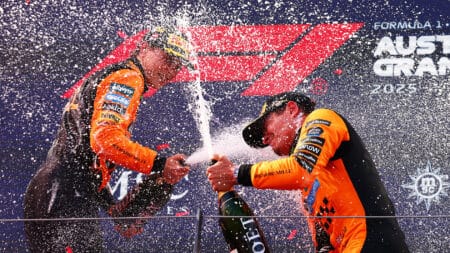
2025 is F1’s most polite title battle ever – Up/Down in Austria
Describing this year's championship race as a 'battle' might be slightly over-egging it, writes James Elson
Red Bull boss Dietrich Mateschitz has once again made it plain that he’s serious about pulling both his teams out of F1 at the end of this season if he cannot secure the supply of a “fully competitive engine”.
The Renault partnership is in the process of being annulled one year early by mutual consent, Mercedes has officially declined the opportunity of possibly being out-performed and almost certainly being criticised by Red Bull if it is not – and so now that prospect is on offer to Ferrari.

Talks between Red Bull and Ferrari were said in Singapore – by Red Bull – to have been positive and encouraging. But now Bernie Ecclestone has confirmed that Fiat and Ferrari boss Sergio Marchionne has concerns.
Why wouldn’t he? He’d just watched his car being pressured hard for victory by Daniel Ricciardo in a Red Bull with around 40bhp less than the Ferrari. He will almost certainly have read to him Mateschitz’s comments in Red Bull’s own publication that he needs a Ferrari engine exactly the same as those supplied to Vettel and Räikkönen.
A customer dictating to Ferrari? A customer, what’s more, with a history of complaining publically about engine partners. From Marchionne’s perspective, Red Bull might sound like it’s complaining before it’s even got the deal! But hang on…
Mateschitz’s perspective is rather different. Formula 1 is not the reason for Red Bull’s existence. The F1 team is just another marketing tool for the softs drinks business. If the team is being denied a chance to win, then he doesn’t feel F1 will be a worthwhile marketing platform for his business, so why stay in?

Red Bull previously used Ferrari engines in 2006
F1 gets very precious about itself sometimes but why shouldn’t a businessman make a call about whether the sport is serving his business needs and act accordingly? This isn’t the same as Williams or McLaren threatening to withdraw. Red Bull is a totally different sort of entity, one for which the sport is a business tool, not the sole reason for existence. The same applies to Mercedes, Renault and Honda.
Red Bull F1 is a unique hybrid of a team – independent, but funded up to the level of a manufacturer team. That independence has blind-sided the sport, led it to forget Red Bull does not share its broad values with the other independents. Only now comes the reminder that its reason for participation is more akin to that of a manufacturer.
Click here to read Nigel Roebuck’s opinion: Red Bull’s complaints are hurting F1
But it’s a hybrid in the sense that it doesn’t make its own engines. And it’s a handful for those manufacturers that supply it because it’s so damn good. What will be the market place (and stock market) perception if Ferrari – builder of the most revered exotic road cars – gets beaten with the same engine by a soft drinks manufacturer? Ferrari has every reason to say no, Red Bull has every reason to say, ‘in which case we leave’.
It all highlights just how dependent F1 has become upon engine manufacturers. If Renault fails to complete its purchase of Enstone, we could be back down to three – and with possibly only two of them competitive. It’s a great pity there isn’t the 2015 hybrid V6 equivalent of a Cosworth DFV – an off-the-shelf competitive engine available to anyone.

Michele Alboreto scored the off-the-shelf DFV’s last win in 1983
The R&D budget required for this generation of engine sort of puts the kybosh upon that idea. But what if a basic ‘independents’ engine’ were created that would be tweaked via fuel flow to be almost but not quite as good as the best manufacturer engine?
The FIA has all the figures of each engine. Allowing a basic, relatively cheap, solidly-engineered but not cutting edge engine a greater fuel rate than the standard 100kg per hour could keep it competitive with whatever the factories came up with. That’s not a very purist idea, perhaps, but it would at least begin to put the sport in control of its own destiny.
Had F1 been owned by a true owner, prepared to invest in the business rather than simply bleed it dry, that’s the sort of long term planning it might have made.

Describing this year's championship race as a 'battle' might be slightly over-egging it, writes James Elson

You had to read between the lines at the 2025 Austrian Grand Prix as George Russell dropped hints over about his dissatisfaction, and F1 sent a message to FIA president Mohammed Ben Sulayem

From zero to hero: in a pacy McLaren, at one of his favourite F1 circuits, Lando Norris picked himself up from a disastrous Canadian race to reign supreme in the 2025 Austrian Grand Prix

Full F1 schedule for the year, including the next F1 race of 2025: the British Grand Prix at Silverstone, the whole calendar and circuit guides for the 24-race Formula 1 season